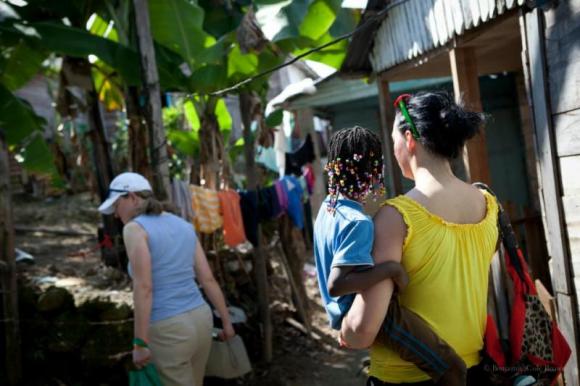A day at the garbage dump
Today was garbage dump day. THE day I equally feared and looked forward to most. Who would have known it would turn out to be one of the best experiences of my life. Hands down. Bar none.
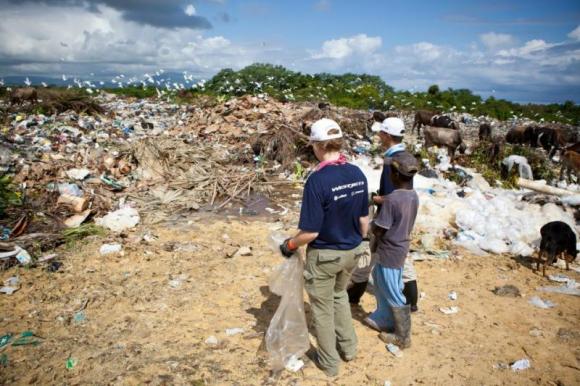
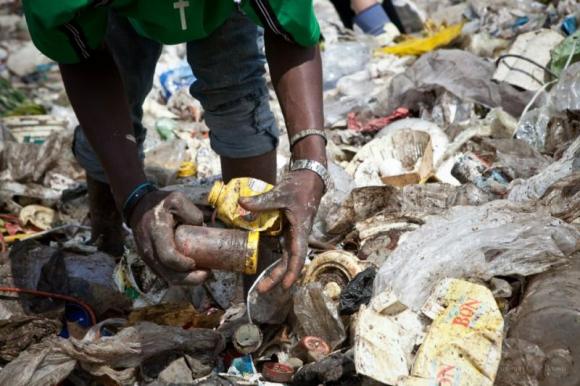
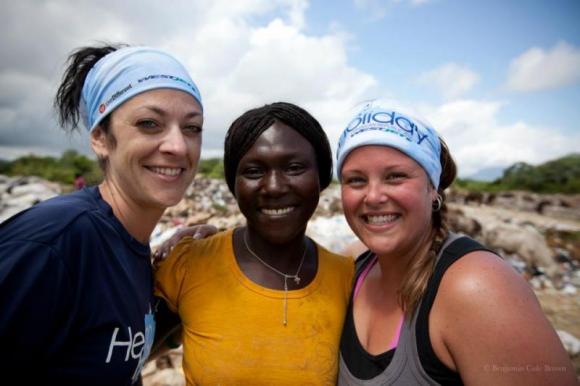
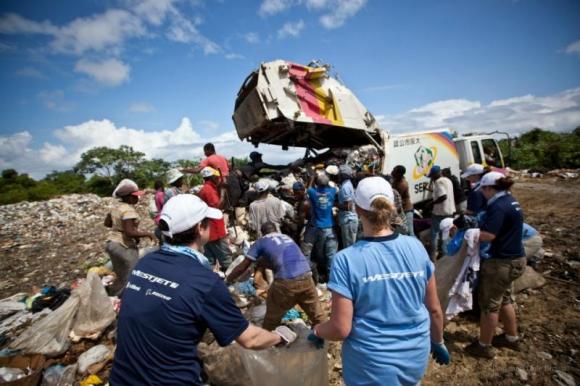
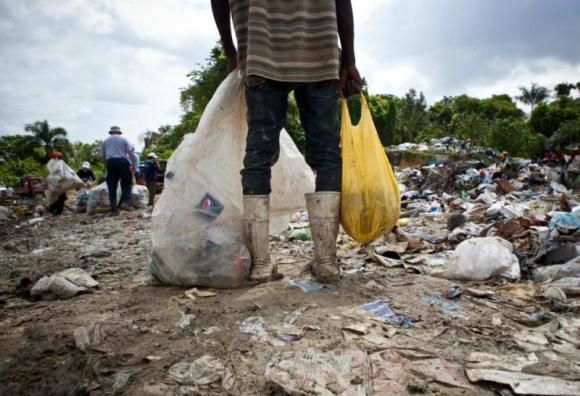
Today was garbage dump day. THE day I equally feared and looked forward to most. Who would have known it would turn out to be one of the best experiences of my life. Hands down. Bar none.





We had planned to sleep in as late as possible today. One, because it was our day off of work. And two, because if we slept through breakfast we would only have to spend money on two meals for the day. But to our surprise we were all awake and out of bed by 9am. We figured we would start the day by bucket showering in our tarp shower. Even though there was almost no wind and the sun was shining the shower was cold and more of a chore than the relaxing luxury we are used to. After the showers we started doing our laundry by hand on a cement block. We have watched many families do this before but we definitely were shocked at how tiring it is. It is nothing like just throwing our clothes into a washing machine. There was a lot of thought that needed to be put into it. What will take the longest to dry? What clothes do we want to wear tomorrow? Do we have enough room to hang it all to make sure it dries in time?
After spending a good portion of our day washing clothes that we knew would just get dirty at work tomorrow, we figured we deserved a short break. But living like this there is no time for a break – we needed to figure out lunch with the little money we had. Thankfully generous neighbours helped us out once again and gave us a delicious lunch. After lunch we had the option of washing a truck and walking a dog for an extra sixty pesos. Normally we wouldn’t work on our day off for such a small amount of money but today that money meant more food, so we took the work happily.
After work we went straight out to buy dinner and collected firewood the whole way home by instinct now. On the way home Shayna found a ten peso coin (about 80 cents Canadian) on the ground. Normally we would not have thought much of it and maybe spent it on some chocolate we thought we needed to have. But instead the first thing she thought of was that it would be enough for a jug of clean drinking water. This is how the shack week is changing us – where as once we would have thought of our own selfish wants, we have now started to shift our priorities. Just like our neighbours here in Mexico we have learned how to be resourceful and how to place the needs of our group above our previous consumeristic, individualistic mindsets. Shayna could have quietly picked up that coin and treated herself to M&M’s. But instead she thought of how this money could benefit the group – she had found water in the dusty street.
Today we woke up bright and early, ready to hit the beach in search of clams. Clamming is a common profession here, with every dozen clams earning the worker about thirty pesos (or less that three dollars). As it turned out, the other clammers were running on Mexican time and we ended up waiting on the beach for a few hours. Instead of napping or taking the time to relax, all that was on our minds was where we would find our next paycheck.
Once the team arrived we got geared up to meet the waves. They set us up with pitchforks and clamming nets and we charged into the surf chanting “Ubuntu!” all the way. It’s funny how the cold hits you in the water. At first it was just the water temperature, but then the wind began to pick up and we were shivering as we worked. In any case, the first hour was less than productive. We averaged one or two clams each – not nearly enough to feed our family of six or pay the bills. As much as we wanted to quit, we couldn’t. We needed money to support ourselves. In the right conditions clammers can catch eight to twelve dozen clams but conditions had not been our favour. We realized that people here must have to save their money to cover days like this when the waves and wind make it difficult to find clams. We also identified with the feeling of desperation that many must feel when struggling to make enough money to take care of their families. After a few hours had passed we made our way home, with only forty pesos in our pocket and not enough money for dinner.
We scraped together some lunch before heading to our next job of the day – helping a rich lady with some household cleaning (actually Rosa at the LiveDifferent house). Going back to the big house, even after just a few days, was shocking for us. Transitioning from a dirt floor and tarps to a comparative mansion left us a little homesick, but also reminded us of what we could look forward to at the end of the week. Our jobs included cleaning ceiling fans, washing cars, cleaning paint trays, and sweeping the driveway. But the end of the day we still only had about 140 pesos, after paying the bills and rent for tomorrow.
At the end of the work day we came home to a sweet surprise. Our neighbours had brought us coffee and pastries – one of the highlights of the evening! In the true spirit of ‘ubuntu’ we shared them all. That’s what impacted us most today – that despite the hardships we experience from time to time, we will always stick together and that will make us strong. Bring on the next four days because we’re ready for adventures.
———————————————————————-
My highlight of shack week so far was when we were working at the LiveDifferent house. Ryan, one of the staff, had given Jenn one tortilla chip with dip. Instead of eating it all herself, she ran out of the house and shared the chip between the six of us. If that isn’t ‘ubuntu’ I don’t know what is. – Brittany, Academy student
It is day 2 of building in Aguas Negras and the feeling of joy and happiness is in the air. WestJetters, contractors, translators and the owners of the homes have been hard at work in all conditions, from scorching heat to rainstorms. To see the sense of determination in everyone’s eyes to complete these homes is inspiring.
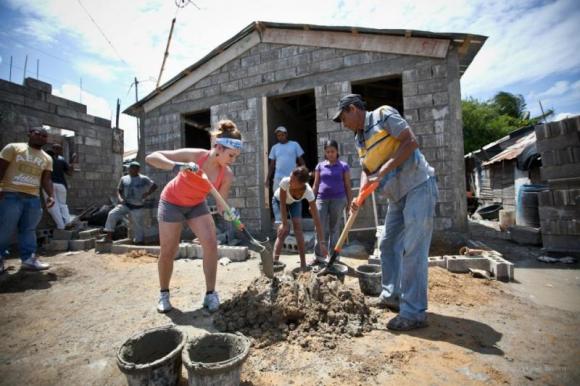

WestJet workers bring relief to impoverished community
Volunteers help build homes in Dominican Republic
Well, we survived our first night in our shack….barely. [cue suspenseful music] It turns out that six gringas really do know how to build a shelter. We all woke up at 4:30am, ready to head out to the strawberry fields. Now let’s get something straight about strawberry picking – this is no walk in the park. The workers here are amazing. They spend hours hunched over in the field, meticulously sorting through thousands of berries for nine to thirteen hours a day. You don’t just need to pick the strawberries, you also need to pack the perfect box of strawberries to be shipped north to the United States and Canada.
By the end of our shift, us LiveDifferent Academy students were exhausted, both physically and mentally. We left the field with a renewed respect for the people who work there. After all, while our time at the strawberry ranch was short-lived, the workers continue day-in and day-out to provide the best berries for their picky and ever-consuming North American neighbours.
The big picture hit us at the beginning of the day – the realization that we are all connected. Even by something as simple and sweet as a strawberry. You see the boxes that we spent nine hours packing were printed in both English and French. The fruit from our full day of manual labour that we had experienced and been paid less than eleven dollars apiece was being shipped to Canada. Whenever we used to open a box of fresh strawberries at home, we would only anticipate the instant gratification and convenience of them. Now we will picture the girls our age who cover their faces so as to not breathe in the pesticides. We will see the foreman of our berry ranch who has worked in the fields for his entire life and is an expert at what he does, yet is paid only a few pesos more than a new worker. We will look at the berries and recognize the effort that goes into choosing the perfect berry – not too small, not too red, not too white and not too ugly.
We arrived home after work to wind and rain. Starting a cooking fire is a challenge to begin with when the fuel is just sticks. But cooking in the rain is harder. However we pulled through, set fire in the rain, and managed to do it all with smiles on our faces. As we were washing our dishes (also in the rain), we noticed two field workers walk past our yard – not abnormal in our town. One of them noticed us and waved as she continued on her way home. She had worked alongside us in the field today and while we left at 3:30pm, the rest of the crew had gotten off work at 7pm and were just arriving home.
So far this experience has made us appreciate hard work, learn the true value of money, and learn how to stay positive under harsh conditions. One thing is certain – we will never look at a box of strawberries the same way again.




Early in the morning we left our house, a mansion compared to those around it, and dropped our few belongings in our “shack”. Our first job of the week was to pick rocks at the beach. The rocks picked on the beaches of Mexico are often sold and used for landscaping in the United States. So we sat down on the beach surrounded by millions of wet rocks, thinking that this would be an easy job. As we picked out the perfectly smooth, blue-ish gray rocks in specific sizes, we realized how mind-numbing and tedious this job truly is. By the end of the day we had picked about forty 5-gallon buckets of rocks and were more than ready to head home. Being a rather windy day, we had a few minor repairs to make to our casita (little house). We spent the remainder of our paycheck (200 pesos after rent, water and transportation) on drinking water, food for the next 24-hours and a few other necessities. In order to cook dinner we sent a few people out to collect firewood while the rest dug a hole for the fire. We successfully cooked a hearty meal of pasta with tomato sauce and hotdog wieners. We have never been so proud of a dinner! Although we were rather exhausted after the day, we know that tomorrow will be even more challenging. We have quickly come to the realization that our former lives are in fact quite glamorous.
This week LiveDifferent Academy students will be walking in the shoes of their Mexican neighbours. They have gathered cardboard and plastic from the streets and received some gifts of wood and tarps from a friend. With these they have used the tee-pee design of their Canadian indigenous people to make a home to protect themselves from the wind and rain for a week. During the building process they have already gained a new appreciation for creativity of the small houses of people they have come to know and love. A few weeks ago if a nail bent when they were building Hero Holiday houses, they would toss it aside and grab a new nail. Yesterday they carefully straightened the nail and re-used it.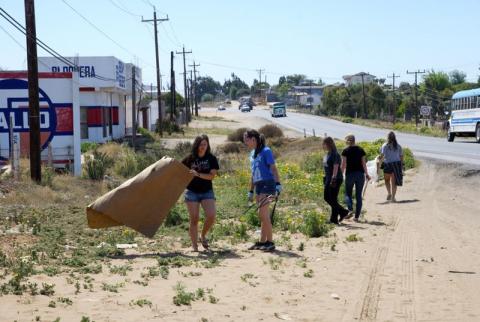
For a week they will be learning about the daily in’s and out’s of life for many of the migrant families that have moved to Baja California, Mexico looking for work. They will be working common jobs such as picking strawberries, clamming, fencing and picking landscaping rocks from the beach. Meal planning, shopping and cooking will take on a whole new meaning as they learn to live on the same wage of twelve dollars per day as the people they will working alongside.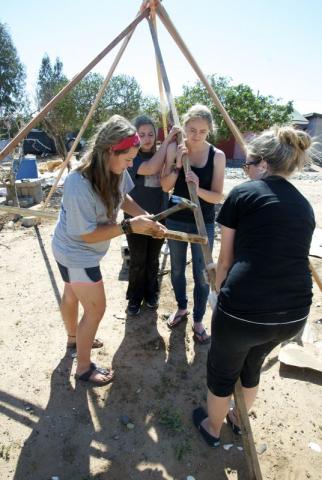
But this experience is about so much more than learning how to cook on a fire, do laundry by hand or learning how to pick the perfect strawberries to be shipped to Canadian grocery stores. And that’s why they have chosen the word ‘ubuntu’ as their team name. This South African concept is described by Desmond Tutu as recognizing that our humanity is caught up and is inextricably bound up in each other’s humanity. I am because we are. A person with ubuntu knows that they belong in a greater whole and that they are diminished when others are humiliated or diminished. And so we seek to understand what life is like for people who have not been born into the opportunities we take for granted as Canadians. We want to show solidarity and that we appreciate how and where our landscaping rocks and fresh strawberries come from. And we seek to understand how we can make changes in our world so that our friends around the globe will know that their lives, like ours, hold great value.


